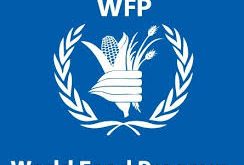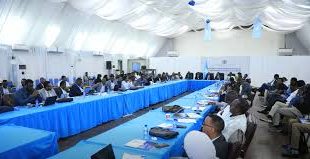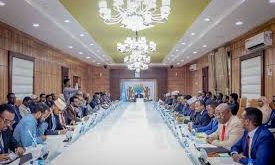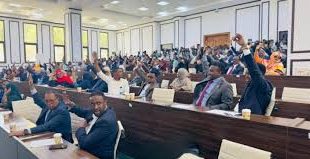GENEVA — The United Kingdom (UK) and Somalia jointly hosted an official side event at the 60th session of the UN Human Rights Council in Geneva, held under the theme: “Somalia’s Human Rights Transition: From Country-Specific Mandate to Strengthened National Institutions and International Human Rights Mechanism.”
The event featured addresses by Khadija Mohamed Al-Makhzoumi, Somali Minister of Family and Human Rights Development, and Eleanor Sanders, UK Ambassador for Human Rights, drawing a substantial audience of member states, international organisations, and civil society representatives.
A key statement was delivered by Omar Faruk Osman, Secretary General of the National Union of Somali Journalists (NUSOJ), who acknowledged the establishment of the National Human Rights Commission and the adoption of new policies as signs of progress.
He commended the government for creating space for civil society engagement, stressing that constructive partnership is essential for a rights-respecting future.
However, Osman concurrently warned that progress should not mask the stark reality of the human rights situation, particularly the crisis of media freedom. He asserted that while the killing of journalists may have declined, repression has “evolved and expanded,” citing widespread and escalating instances of intimidation, arbitrary arrests, beatings, media bans, censorship, and online/offline harassment against journalists, especially women.
Osman highlighted the deeply ingrained culture of impunity for past murders of journalists and pointed to the 1964 Penal Code, the revised 2020 Media Law, and the Anti-Terrorism Law as an antiquated and oppressive legal system that continues to undermine the transition by criminalizing journalism and restricting freedom of expression.
The NUSOJ Secretary General called for urgent legal reforms, including the domestication of international human rights conventions and the extension of a standing invitation to all UN Special Procedures Mandate Holders, specifically urging for visits from the Special Rapporteurs on Freedom of Expression, Human Rights Defenders, and Freedom of Association.
The discussion concluded that while Somalia has taken essential initial steps, the human rights transition remains fragile. Media freedom and civic space must be placed at the centre of reform efforts for the country to achieve lasting protection of fundamental rights.
 Somali Observatory for Humanitarian Affairs It is a specialized, independent, non-profit media network that observes and follows up the Somali humanitarian scene
Somali Observatory for Humanitarian Affairs It is a specialized, independent, non-profit media network that observes and follows up the Somali humanitarian scene



